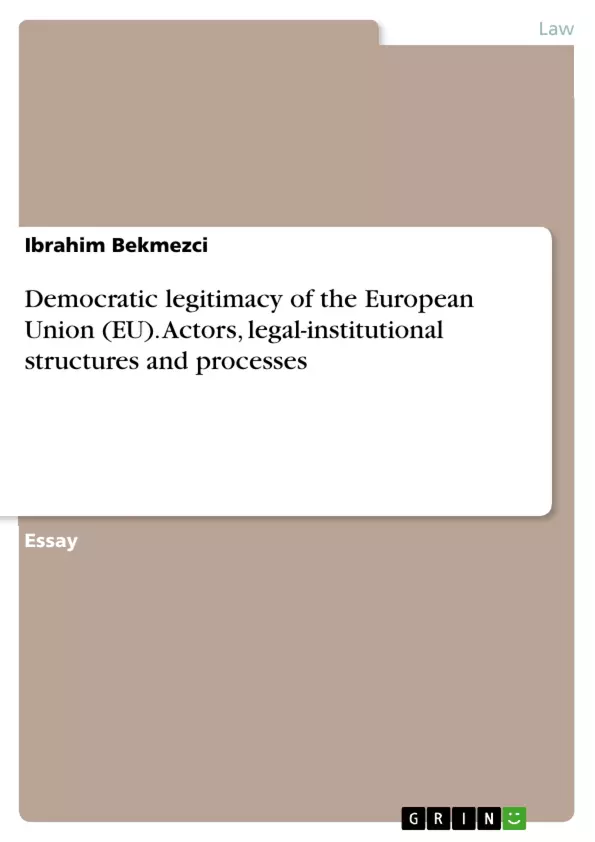The main questions of this study are: What is the EU actually, how does the EU system work at all and which goals and values is the EU pursuing? How is the EU institutionally structured and who are the main actors in the EU? How does the EU make decisions, how does it act and how is the EU democratic?
Corona, the rule of law, migration, the economy, relations with the USA and China: The European Union (EU), which is far from always being united itself, faces a multitude of challenges. The EU is often criticized in the system of international relations for showing a “democratic deficit”. In this essay, the foundations, institutions, and procedures of the EU system are discussed with a view to the central question of whether this criticism is correct and whether there are ways to give it democratic legitimacy or to increase it.
In view of the initial questions, the fundamentals, central institutions, and procedures of the EU are discussed within the scope of the present study to better understand the complex relationships and the controversial position. This makes it possible to find answers to important problem areas about the democratic legitimacy of the EU. The aim is to make an objective and scientific as possible contribution to the debate on the “EU Project” whose finality is unknown.
Inhaltsverzeichnis (Table of Contents)
- Introduction
- What is the "EU"?
- Characterization of the EU
- Fundamental Values and Principles of the EU
- Institutional Structure and Actors of the EU
- Decision-Making Process of the EU
- Influence of EU Citizens on European Politics
- Democratic Legitimacy of the EU
- Conclusion
Zielsetzung und Themenschwerpunkte (Objectives and Key Themes)
The objective of this essay is to critically examine the structure, processes, and democratic legitimacy of the European Union (EU). It investigates whether the EU's system is genuinely democratic or if it exhibits a "democratic deficit" as often criticized. By analyzing the EU's foundational principles, institutional frameworks, and decision-making procedures, the essay aims to contribute to the ongoing debate surrounding the EU's democratic character.
- The nature of the EU as a unique political entity distinct from a state or a purely international organization.
- The evolution and functioning of the EU's legal-institutional framework based on supranational and intergovernmental cooperation.
- The key values and principles that underpin the EU system, including the rule of law and democratic principles.
- The main actors and institutions within the EU, including the European Commission, Parliament, Council, and Court of Justice.
- The decision-making processes within the EU and the mechanisms through which EU citizens can influence European politics.
Zusammenfassung der Kapitel (Chapter Summaries)
- Introduction: This chapter sets the stage by introducing the EU's current challenges, including the rule of law, migration, economic issues, and relations with global powers like the USA and China. It highlights the frequent criticism of a "democratic deficit" within the EU and outlines the essay's focus on examining the EU's structure, institutions, and procedures to determine the validity of this criticism and potential solutions.
- What is the "EU"?: This chapter delves into the fundamental nature of the EU, defining it as a European project based on supranational integration, intergovernmental cooperation, and international cooperation within a multilateral world order system. It emphasizes the EU's unique status as a political partnership between independent states while highlighting the historical motives behind its formation, such as the desire for peace, security, and economic development.
- Characterization of the EU: This chapter explores the EU's evolution as a political system, tracing its development through the European integration process. It clarifies that the EU is currently governed by two core treaties, the TEU and TFEU, and underscores its adherence to the rule of law, where all actions must be based on democratically approved treaties.
Schlüsselwörter (Keywords)
The main keywords and focus topics of this essay include the European Union, supranational integration, intergovernmental cooperation, democratic deficit, rule of law, institutional structure, decision-making process, European Commission, European Parliament, Council of the EU, Court of Justice of the European Union, democratic legitimacy, European integration, and treaties.
- Arbeit zitieren
- Ibrahim Bekmezci (Autor:in), 2022, Democratic legitimacy of the European Union (EU). Actors, legal-institutional structures and processes, München, GRIN Verlag, https://www.hausarbeiten.de/document/1181164


